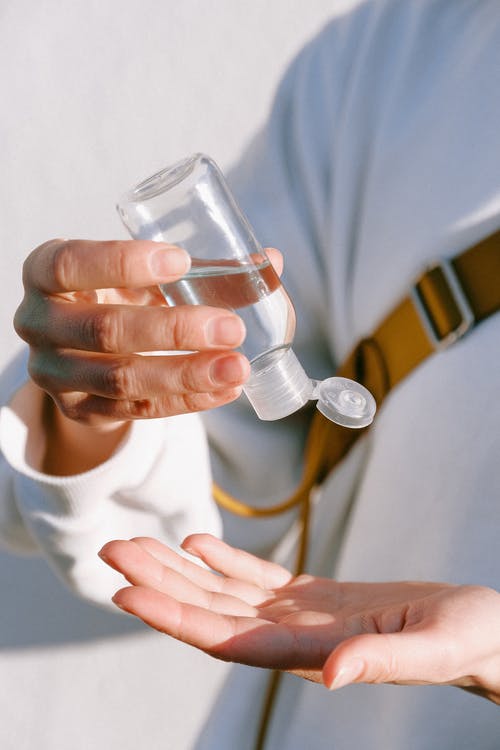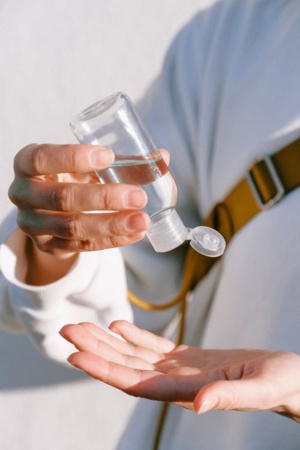Dailycsr.com – 30 June 2020 – No one had anticipated that hand sanitizers could become so important. If immediate steps were not taken then the country would have faced a shortage. In March, The Georgia Institute of Technology’s professor, Marder brought together all the partners and colleagues and worked to “replaced a key component of hand sanitizer” by the beginning of June. Likewise, a new “supply chain” came into existence which was initiated with their “own donation of 7,000 gallons of a newly designed sanitizer to medical facilities”.
They named it “Han-I-Size White & Gold” after Georgia Tech’s colours, whereby ensuring that manufacturers don’t “run out of the main active ingredient” of hand sanitizers, namely alcohol. However, it wasn’t an easy success for the team. The professor at “School of Chemistry and Biochemistry” in Georgia Tech said:
“This project was on life support so many times because people did not understand how severe this shortage was going to be. I called hospitals and institutions to assess the need and heard the same thing over and over: ‘No, we just got a delivery. We have no need. You’re wasting your time.’”
When major chemical suppliers who provide “isopropanol”, one essential ingredients of hand sanitizer, were contacted, Marder learned that isopropanol shortage was waiting round the corner. As Marder added:
“Isopropanol plants in the U.S. were running at full capacity and still didn’t have enough. People were using pharmaceutical-grade ethanol now, too, but it was also in short supply. We weren’t going to have enough of either; I mean the whole United States was running low”.
Here is the list of the people Marder contacted at this juncture:
“Marder hastily drafted Chris Luettgen, a professor of practice in Georgia Tech’s School of Chemical and Biomolecular Engineering, George White, interim vice president of Georgia Tech’s Office of Industry Collaboration, and Atif Dabdoub, a Georgia Tech alumnus and owner of a local chemical company, Unichem Technologies, Inc.”
Initially, the three “chemists and the business professional” though of simply mixing “alcohol with water, peroxide, and the moisturizer glycerin” before packing it into bottles. However, it wasn’t as simple. Luettgen used his 25 years’ of business experience to push his way against “unexpected supply chain barriers and bureaucracy” while White had to establish “connections between companies”. In this manner, working through the night and day, the team forged the supply chain and the business connection from the scratch. As Luettgen recounted:
“When I worked for Kimberly-Clark, getting a new product out would take the company nine to 18 months, and the three of us had to get this done in weeks. The demand was there, and people were getting sick in some cases from lack of sanitizing. We felt speed was necessary to meet the growing demand. Seth told me to push this across the goal line, and I put everything into it”.
While, White added:
“Georgia Tech is about the power to convene. Companies and stakeholders are eager to come to the table here to make things happen. Not everyone has that incredible recognition as a problem solver with the brainpower amassed here.”
Talking about the amount of isopropanol needed in comparison to what was being manufactured, Marder added:
“The amount of ethanol that’s made for fuel in the U.S. is 1,500 times the amount of the isopropanol made. They could drain off about 1 percent of what is used for fuel and double or triple the amount of alcohol available for hand sanitizer in this country. And the fuel companies wouldn’t even notice it was gone, especially since hardly anyone was driving anymore”.
However, the smell of the hand sanitizer wasn’t welcoming to the distributor and White recounted:
“I thought, ‘This has the makings of a screenplay.’ I asked the distributor if we could come over to smell a sample for ourselves. It needed a little love.”
Aflac Incorporated donated “$2 million” through “the Global Center for Medical Innovation”, in short GCMI which went into fast forwarding the “development, production, and purchase of other PPE to donate to health care workers”. Moreover, GCMI also collaborated in “regulatory processes” and marketing of the hand sanitizer. On the other hand, Arkema, Inc. made a donation in kind of hydrogen peroxide and the company of Coca Cola donated a tanker truck of purified water.
And Ben Brumfield informed:
“Finally, the first few hundred gallons of donated Han-I-Size White & Gold rolled into Piedmont Healthcare in Atlanta and Brightmoor Nursing Center in Griffin, Georgia, in the second week of June 2020”.
References:
gatech.edu
They named it “Han-I-Size White & Gold” after Georgia Tech’s colours, whereby ensuring that manufacturers don’t “run out of the main active ingredient” of hand sanitizers, namely alcohol. However, it wasn’t an easy success for the team. The professor at “School of Chemistry and Biochemistry” in Georgia Tech said:
“This project was on life support so many times because people did not understand how severe this shortage was going to be. I called hospitals and institutions to assess the need and heard the same thing over and over: ‘No, we just got a delivery. We have no need. You’re wasting your time.’”
When major chemical suppliers who provide “isopropanol”, one essential ingredients of hand sanitizer, were contacted, Marder learned that isopropanol shortage was waiting round the corner. As Marder added:
“Isopropanol plants in the U.S. were running at full capacity and still didn’t have enough. People were using pharmaceutical-grade ethanol now, too, but it was also in short supply. We weren’t going to have enough of either; I mean the whole United States was running low”.
Here is the list of the people Marder contacted at this juncture:
“Marder hastily drafted Chris Luettgen, a professor of practice in Georgia Tech’s School of Chemical and Biomolecular Engineering, George White, interim vice president of Georgia Tech’s Office of Industry Collaboration, and Atif Dabdoub, a Georgia Tech alumnus and owner of a local chemical company, Unichem Technologies, Inc.”
Initially, the three “chemists and the business professional” though of simply mixing “alcohol with water, peroxide, and the moisturizer glycerin” before packing it into bottles. However, it wasn’t as simple. Luettgen used his 25 years’ of business experience to push his way against “unexpected supply chain barriers and bureaucracy” while White had to establish “connections between companies”. In this manner, working through the night and day, the team forged the supply chain and the business connection from the scratch. As Luettgen recounted:
“When I worked for Kimberly-Clark, getting a new product out would take the company nine to 18 months, and the three of us had to get this done in weeks. The demand was there, and people were getting sick in some cases from lack of sanitizing. We felt speed was necessary to meet the growing demand. Seth told me to push this across the goal line, and I put everything into it”.
While, White added:
“Georgia Tech is about the power to convene. Companies and stakeholders are eager to come to the table here to make things happen. Not everyone has that incredible recognition as a problem solver with the brainpower amassed here.”
Talking about the amount of isopropanol needed in comparison to what was being manufactured, Marder added:
“The amount of ethanol that’s made for fuel in the U.S. is 1,500 times the amount of the isopropanol made. They could drain off about 1 percent of what is used for fuel and double or triple the amount of alcohol available for hand sanitizer in this country. And the fuel companies wouldn’t even notice it was gone, especially since hardly anyone was driving anymore”.
However, the smell of the hand sanitizer wasn’t welcoming to the distributor and White recounted:
“I thought, ‘This has the makings of a screenplay.’ I asked the distributor if we could come over to smell a sample for ourselves. It needed a little love.”
Aflac Incorporated donated “$2 million” through “the Global Center for Medical Innovation”, in short GCMI which went into fast forwarding the “development, production, and purchase of other PPE to donate to health care workers”. Moreover, GCMI also collaborated in “regulatory processes” and marketing of the hand sanitizer. On the other hand, Arkema, Inc. made a donation in kind of hydrogen peroxide and the company of Coca Cola donated a tanker truck of purified water.
And Ben Brumfield informed:
“Finally, the first few hundred gallons of donated Han-I-Size White & Gold rolled into Piedmont Healthcare in Atlanta and Brightmoor Nursing Center in Griffin, Georgia, in the second week of June 2020”.
References:
gatech.edu


 Hand Sanitizer In New Design Fostering New Corporate Relations And Supply Chain
Hand Sanitizer In New Design Fostering New Corporate Relations And Supply Chain





 Companies
Companies